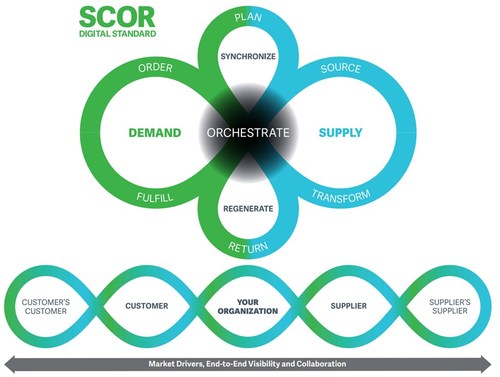Updated Model Integrates Sustainability Standards and Optimizes Supply Chains to Improve Business Performance
CHICAGO, Sept. 19, 2022 /PRNewswire/ — The Association for Supply Chain Management (ASCM), the global pacesetter of organizational transformation, talent development and supply chain innovation, today released a new Supply Chain Operations Reference Digital Standard (SCOR DS). As the most significant update since the inception of SCOR in 1996, the new SCOR DS modernizes the open access framework to include resilience, economic, and sustainability metrics and benchmarks; process changes supporting retail, omnichannel, strategic sourcing; and overall orchestration of supply chain strategy. In addition, the new SCOR DS moves end-to-end supply chain thinking from a linear, trading partner orientation to a dynamic, asynchronous supply network that focuses on market drivers, visibility, and collaboration.
“Our community really came together on this revamp of SCOR. It was like the energy in the room when SCOR 1.0 first launched. Our biggest measure of success was for all stakeholders to be able to see themselves, their organizations, and supply chains in the model and that it helps build the process foundation for digital investments to 2030,” said ASCM Executive Vice President Peter Bolstorff, CSCP, SCOR-P.
Developed by a diverse group of subject matter experts, the new SCOR DS updates processes, metrics, skills and practices to ensure coverage across multiple industries. Additionally, performance metrics and practices have been reviewed and revised to give organizations new ways to measure and improve their supply chains.
“It’s critical for us to provide supply chain professionals with the most up-to-date competencies to further their skillsets so they can thrive within the industry. This new update to SCOR offers a more comprehensive industry standard that empowers organizations to utilize and ensure their supply chains reach their full potential,” said ASCM CEO Abe Eshkenazi, CSCP, CPA, CAE.
The original SCOR model recognizes six major processes: Plan, Source, Make, Deliver, Return and Enable. SCOR DS takes these processes further with the following updates:
The addition of Orchestrate to recognize the importance of strategy, business rules, technology and human resources that provide an overarching direction to build a more efficient supply chain.
Deliver was split into Order (customer orders) and Fulfill to give greater detail and emphasis to those activities, practices and metrics.
Make became Transform, to widen its applicability to more types of manufacturing and service providers.
The infinity loop diagram illustrates that supply chains are an ever-moving series of activities, with no artificial starts or stops from process to process.
SCOR DS is free access for all users and can be accessed here.
About the SCOR Model
The SCOR model describes the business activities associated with all phases involved in satisfying customer demand. SCOR is the only comprehensive, universally accepted and open-access supply chain standard. It has been used by thousands of public and private organizations around the world to assess and improve their supply chains, directly leading to improved operational performance.
About ASCM
The Association for Supply Chain Management (ASCM) is the global pacesetter of organizational transformation, talent development and supply chain innovation. As the largest association for supply chain, ASCM members and worldwide alliances fuel innovation and inspire accountability for resilient, dynamic and sustainable operations. ASCM is built on a foundation of world-class APICS education, certification and career resources, which encompass award-winning workforce development, relevant content, groundbreaking industry standards and a diverse community of professionals who are driven to create a better world through supply chain. To learn more, visit ascm.org.
SOURCE ASCM

